When Sarah Dubbeldam (our Editor-in-Chief and Founder at Darling) and I first decided to go to the March on Washington here in Los Angeles, we weren’t sure what we were going to see. The riots in Washington D.C. the day before had left a somewhat bitter and strange taste around the topic of protest, with their violence and lack of respect for the constitutional rights of those around them. But the March on Washington was explicitly different and we knew it: the website cited a strong caution against violence and an adamant faith in the American tradition of peaceful protest. So it was that we found ourselves in a crowd of hundreds of thousands this Saturday with a primary objective: Listen to the people.
As we drifted into the sea of men, women and children I recalled the recent interview I conducted with Susan Stamberg, the “mother of modern radio,” who has herself interviewed seemingly everyone on NPR. I remembered her depiction of standing in Washington D.C. during Martin Luther King Jr.’s “I have a dream” speech, and how she knew she was “seeing history.” Whether or not you believe in the reasons that led millions to march this past weekend, that we have just witnessed a significant moment in history is undeniable.
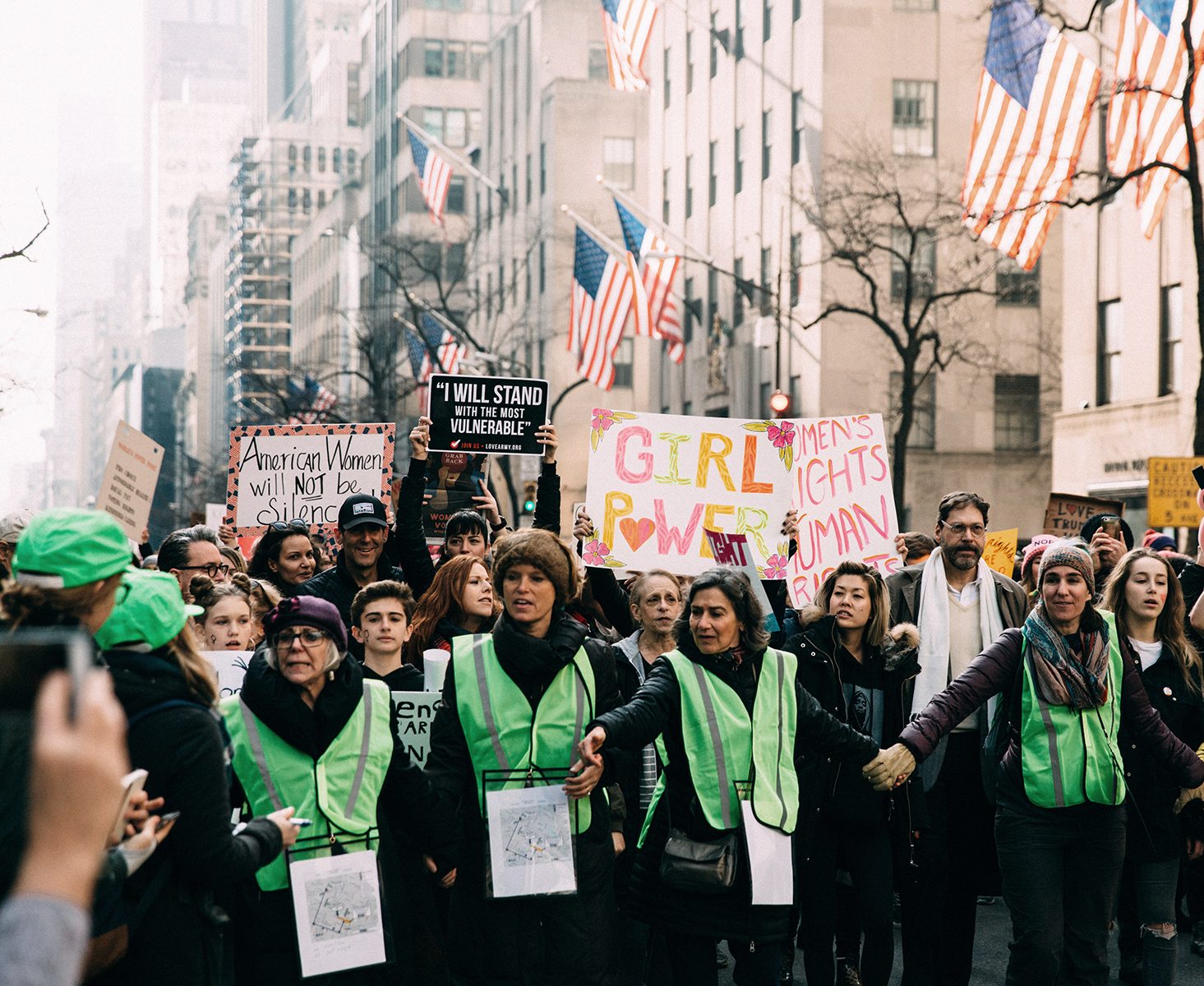
Emotions ran deep, as one marcher told us, “I mean I think it’s a historic moment, and it’s important to show that we’re all here together. I feel like I’ve been on the verge of tears all morning with how many different kinds of people are here.”
One of the earmarks of Saturday that distinguished it so much from other historic marches is the diversity of issues presented. Some signs had one clear agenda, citing healthcare, immigration reform, racism, pro-choice or just anti-Trump statements. Other signs had all of these, plus quite a few other topics thrown in for good measure. And though it was organized “by women for women,” the crowd was full of men holding signs and standing with their friends, spouses and partners.
We began to wander through and ask individuals why they were there. The responses ranged from those who were there to simply show a fury that had finally boiled over, without too much articulation around why, to those who had clear policy points that they wanted protected or changed.
The first woman I spoke to was Emilia Fuentes Grant, who held a sign that spoke of “Situations of Injustice.” I asked her about her sign and she told me that, “the sign is honestly a way to talk to my family back home. They say ‘we voted for the Republican party, not Trump’ but I want them to understand that that’s not true, you can’t be neutral…I think we’ve hit rock bottom with this man who is preaching populist ideas and I say that’s not me, that’s not my beliefs. I disagree with everything he’s said about Latinos, about Muslims, about women and that’s why I’m here.”
The “everything” theme was widespread, which made the march, in some ways, hard to grasp in terms of specific points or issues. I remember back to my early days of education with a teacher insisting that in debate I withhold use of that word, since nobody can truly argue the everyone/no one/everything/nothing points. In terms of resistance, specificity is necessary.
When I spoke to a woman in a burka holding a “We the People” sign with the American flag printed on it, I asked her what she stood for. (The woman chooses to remain anonymous) and she responded:
“I’m marching because I care. I care about what Trump is going to do, how he’s going to affect everyone. Is he going to curb our choices while he makes choices? I care also about the planet. I’m here so he knows that people are watching and people are listening, and so he’s held accountable.”
Though many marched around the topics of immigration or stating (in sometimes a fairly explicit way) a response to the newly reintroduced topic of “locker room talk,” it was true that a large majority were there because of the conservative stance Trump has taken on abortion. As one woman told us:
“So my sign says ‘Girls just want to have fundamental rights,’ simply put. Us women, we do so much for our society and the fact that we have someone who is willing to take away our basic human rights is very frustrating and we deserve everything in this world.”
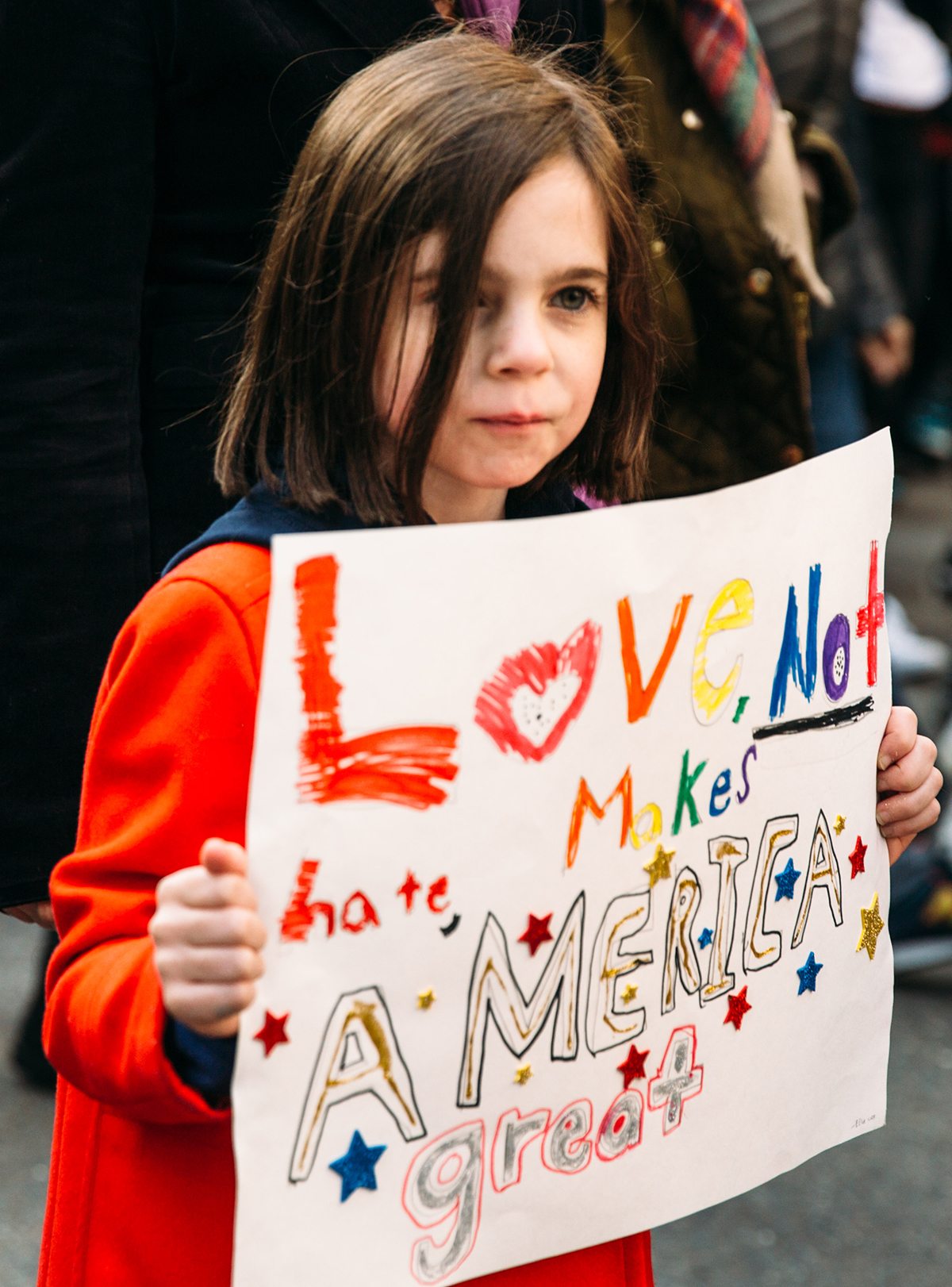
When asked which rights women were most concerned about being taken away, the response was often around sexual health rights, birth control, and abortion. We did meet protestors, however, who wanted it to be known that they were there for equality and to support the dignity of other minorities who were pro-life, but felt that it was necessary to keep their convictions to themselves at this particular event. As one said,
“Sadly, I know that because I’m here marching today for women’s rights and to make it known that I expect the new administration to protect our right to free and affordable health care, pap smears, and screenings, that that means those around me assume I am pro-choice. That’s hard for me, that I have to be silent in that way, because I know that’s not accepted here. But I’m here anyway, because I believe some of these issues to be bigger than our differences on this topic.”
My favorite words came from a couple I met holding signs about women’s equality and respect for diversity in America. Caitlyn Baidas began by explaining that they were there “together but for different reasons.”
“Of course there are a lot of issues that need to be fought for. Women deserve to have the same rights as men and it shouldn’t be about man-hating, but equality, being paid the same, having the same rights,” said Caitlyn Baidas. “I feel like the times are changing, even in film. Women are getting better roles, women are becoming CEOs, it’s a whole new revolution. We have a common enemy now; the minorities are all coming together.”
Among the most thoughtful responses to our questions was the answer given by Jose Lagunas, who stated, “I think Donald Trump is the best thing to happen to democracy in who knows how long. With somebody like Obama or even Bush, there’s a nice facade, a nice face people paint. At least with Trump, we know what we need to do.”
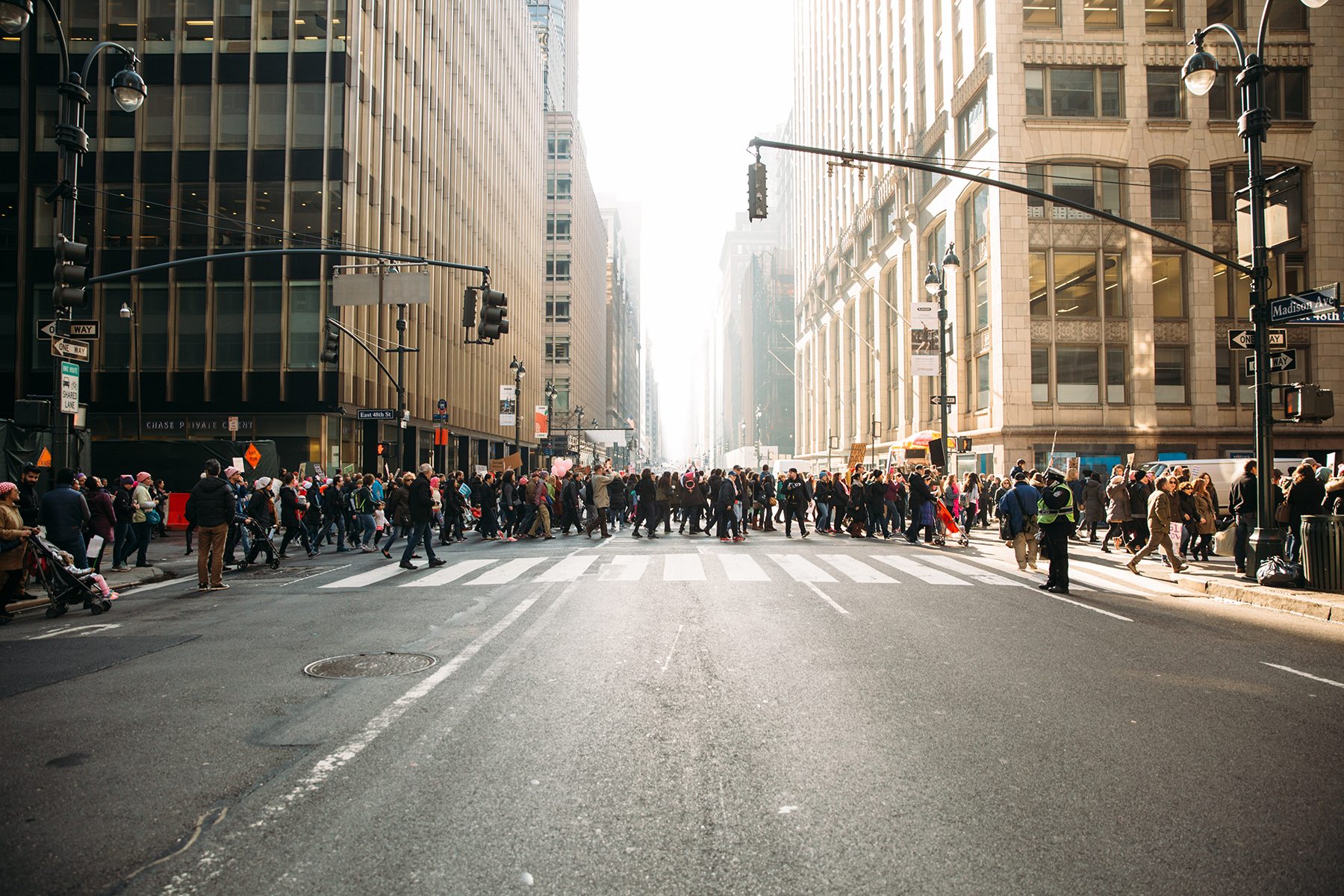
As we listened, it freshly occurred to us that neither Sarah nor I was sure what the “bottom line” was at the March. I began to ask people that question of questions: “If you could change President Trump’s mind on one thing, what would it be?” Many couldn’t decide, but our favorite answer was, “To have more empathy. I feel like he’s missing empathy. He’s only speaking about people who are like him, and that’s why we are here.” – Jose Lagunas.
Empathy is a word we really hope catches on in the following months and years because if one thing was found to be true, it’s that this march was about more than just one man, or one presidency. It was clearly the overflow of decades of mistrust, frustration, anger and pain from a much larger demographic than just women.
We wonder now, how will we each as women take what we have seen and heard and respond to reshape the culture and landscape around us? Now that the march is over, it’s time to, as one sign declared, “Love thy neighbour” in every way that we can.
Did you attend a Women’s March in a city near you? What were you marching for?
Images via Jay Wen at the Women’s March in NYC

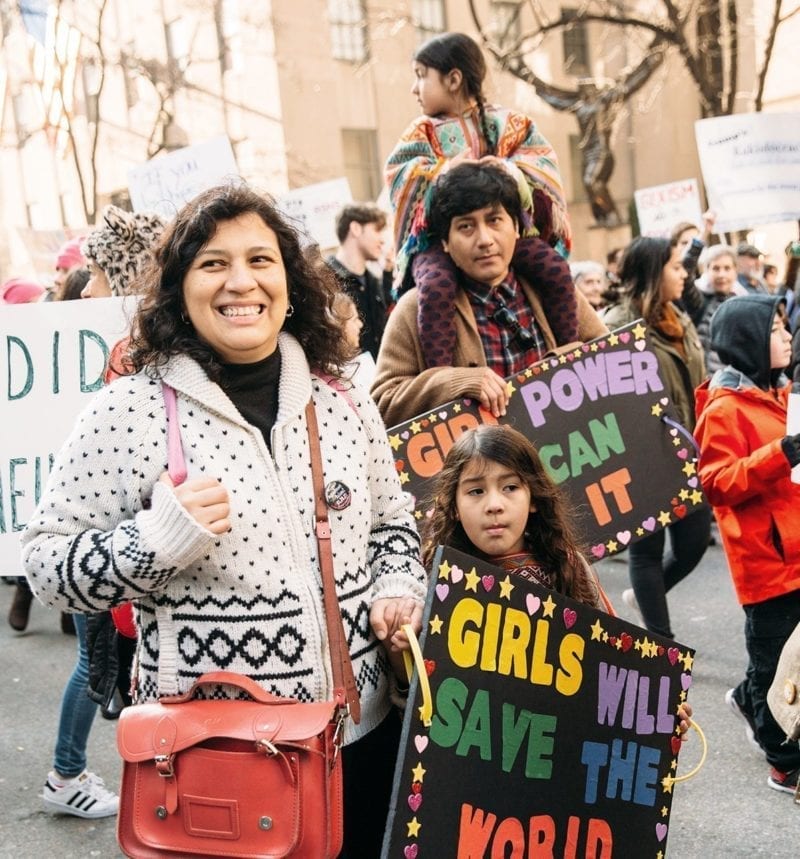

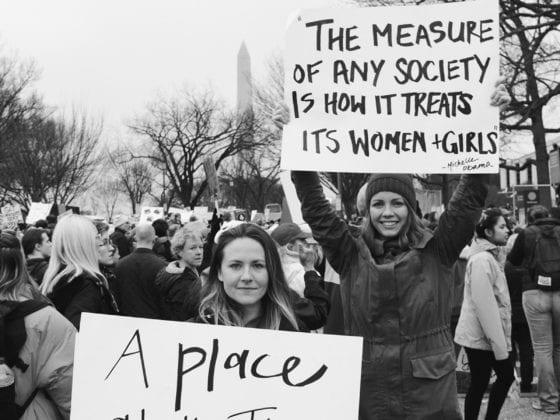








7 comments
YES! Marched in Washington D.C. So glad I did!
Thank you, thank you, thank you. There has been so much bashing from both of sides of the fence and it saddened me to think that the message of love, respect and community was lost. I searched for those that would find the quiet moments of solidarity, and together-ness, even if it was for different reasons (as you said) – i knew if i came to this website, i would find it. Thank you for sharing and restoring my faith that there are people out there that really want to hear and see each other.
Thank you for sharing your personal account of the Women’s March. “Together but for different reasons” is a great way to put it.
Charmaine Ng | Architecture & Lifestyle Blog
https://charmainenyw.com
I appreciate you sharing your perspective, thank you.
“A riot is the language of the unheard.” MLK
I ask that you not be so quick to denounce rioters and their form of protest. Yes, the violence is scary and while not ideal, it is legitimate protest. What may not seem as productive is truly the last resort for many. People of color were further marginalized by this election and I ask that you put yourself in their shoes.
It is critical to understand D.C.’s political and social makeup. They still lack statehood so when they go to the polls to vote on measures or programs they would like to see in their district, it is merely a suggestion because congress has control of their budget. I am privileged to live in LA, CA where my values are reflected in state and local politics. Currently, the District does not enjoy this privilege and does not even have representation in congress. Imagine feeling that silenced and then tell me about constitutional rights.
Thank you for your thoughts–I do know that the governmental make-up and procedures in Washington D.C. are different than the rest of the nation, and that the tension there is particularly high. However, I believe that words are so important, and though I can feel deeply with the pain and frustration that led to the violence of the Inauguration Day protests there, I can’t condone actions such as destruction of property. This piece wasn’t about that march however, but I did feel it important to contextualise the Women’s March on Washington.
Thank you so much for sharing. I felt as if I was the only one somewhat confused at exactly what and why “we” or “they” were marching. I appreciate your perspective, your open mindedness yet grounded-ness and of course your “take away”. I walked away from the weekend frustrated at friends who seemed to be raising a fist for reasons they didn’t even know but this has given me a desire to move forward with them and challenged me to seek more understanding.
Thanks Corrie. I am saddened that dialogue has recently been reduced to either explicit agreement (one party all agreeing with one another) or outright vilification from one camp to another. Women I respect and love both did and didn’t march this weekend, and I think it’s important to hear those voices, which is what we strove to do.